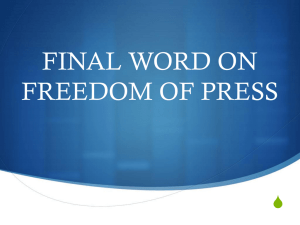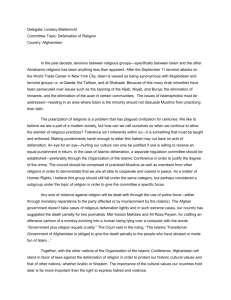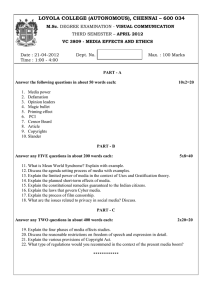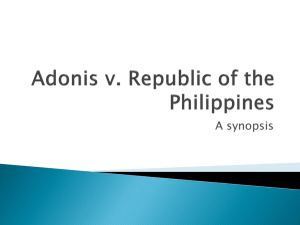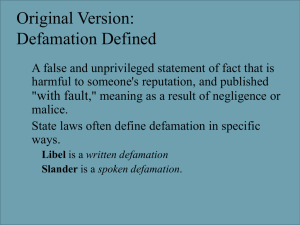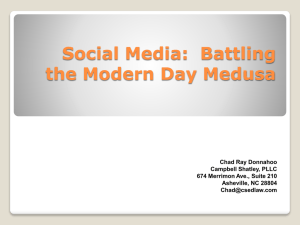Legislative Assembly
advertisement
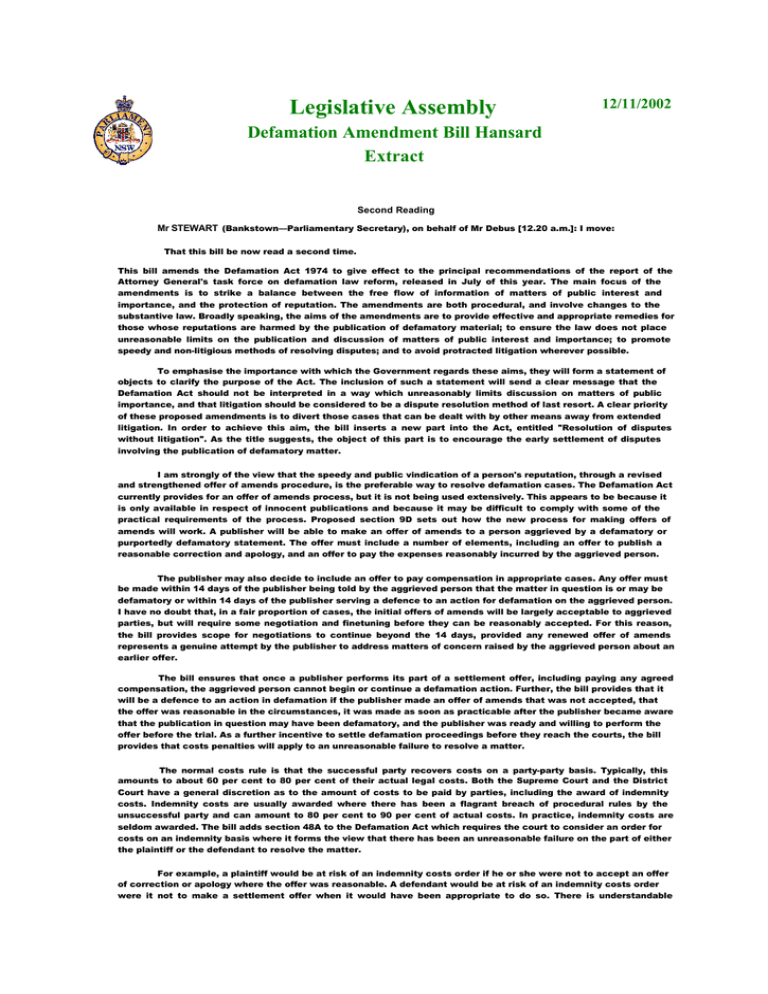
Legislative Assembly 12/11/2002 Defamation Amendment Bill Hansard Extract Second Reading Mr STEWART (Bankstown—Parliamentary Secretary), on behalf of Mr Debus [12.20 a.m.]: I move: That this bill be now read a second time. This bill amends the Defamation Act 1974 to give effect to the principal recommendations of the report of the Attorney General's task force on defamation law reform, released in July of this year. The main focus of the amendments is to strike a balance between the free flow of information of matters of public interest and importance, and the protection of reputation. The amendments are both procedural, and involve changes to the substantive law. Broadly speaking, the aims of the amendments are to provide effective and appropriate remedies for those whose reputations are harmed by the publication of defamatory material; to ensure the law does not place unreasonable limits on the publication and discussion of matters of public interest and importance; to promote speedy and non-litigious methods of resolving disputes; and to avoid protracted litigation wherever possible. To emphasise the importance with which the Government regards these aims, they will form a statement of objects to clarify the purpose of the Act. The inclusion of such a statement will send a clear message that the Defamation Act should not be interpreted in a way which unreasonably limits discussion on matters of public importance, and that litigation should be considered to be a dispute resolution method of last resort. A clear priority of these proposed amendments is to divert those cases that can be dealt with by other means away from extended litigation. In order to achieve this aim, the bill inserts a new part into the Act, entitled "Resolution of disputes without litigation". As the title suggests, the object of this part is to encourage the early settlement of disputes involving the publication of defamatory matter. I am strongly of the view that the speedy and public vindication of a person's reputation, through a revised and strengthened offer of amends procedure, is the preferable way to resolve defamation cases. The Defamation Act currently provides for an offer of amends process, but it is not being used extensively. This appears to be because it is only available in respect of innocent publications and because it may be difficult to comply with some of the practical requirements of the process. Proposed section 9D sets out how the new process for making offers of amends will work. A publisher will be able to make an offer of amends to a person aggrieved by a defamatory or purportedly defamatory statement. The offer must include a number of elements, including an offer to publish a reasonable correction and apology, and an offer to pay the expenses reasonably incurred by the aggrieved person. The publisher may also decide to include an offer to pay compensation in appropriate cases. Any offer must be made within 14 days of the publisher being told by the aggrieved person that the matter in question is or may be defamatory or within 14 days of the publisher serving a defence to an action for defamation on the aggrieved person. I have no doubt that, in a fair proportion of cases, the initial offers of amends will be largely acceptable to aggrieved parties, but will require some negotiation and finetuning before they can be reasonably accepted. For this reason, the bill provides scope for negotiations to continue beyond the 14 days, provided any renewed offer of amends represents a genuine attempt by the publisher to address matters of concern raised by the aggrieved person about an earlier offer. The bill ensures that once a publisher performs its part of a settlement offer, including paying any agreed compensation, the aggrieved person cannot begin or continue a defamation action. Further, the bill provides that it will be a defence to an action in defamation if the publisher made an offer of amends that was not accepted, that the offer was reasonable in the circumstances, it was made as soon as practicable after the publisher became aware that the publication in question may have been defamatory, and the publisher was ready and willing to perform the offer before the trial. As a further incentive to settle defamation proceedings before they reach the courts, the bill provides that costs penalties will apply to an unreasonable failure to resolve a matter. The normal costs rule is that the successful party recovers costs on a party-party basis. Typically, this amounts to about 60 per cent to 80 per cent of their actual legal costs. Both the Supreme Court and the District Court have a general discretion as to the amount of costs to be paid by parties, including the award of indemnity costs. Indemnity costs are usually awarded where there has been a flagrant breach of procedural rules by the unsuccessful party and can amount to 80 per cent to 90 per cent of actual costs. In practice, indemnity costs are seldom awarded. The bill adds section 48A to the Defamation Act which requires the court to consider an order for costs on an indemnity basis where it forms the view that there has been an unreasonable failure on the part of either the plaintiff or the defendant to resolve the matter. For example, a plaintiff would be at risk of an indemnity costs order if he or she were not to accept an offer of correction or apology where the offer was reasonable. A defendant would be at risk of an indemnity costs order were it not to make a settlement offer when it would have been appropriate to do so. There is understandable Legislative Assembly Extract - Defamation Amendment Bill - Tuesday 12 November 2002 concern about wealthy parties, whether plaintiffs or defendants, using their deep pockets to wear down opponents of modest means to discourage them from continuing, or indeed even commencing, defamation proceedings for fear of a ruinous costs order. It is not unheard of, for example, for property developers to commence proceedings known as SLAPPs—strategic lawsuits against public participation—against individuals or community groups to silence their opposition to a proposed development. There is also anecdotal evidence of some wealthy individuals pursuing every procedural avenue open to them despite the prospects of success being slim and despite their legal fees far outweighing any potential damages award. The object in such cases is to intimidate the defendant into settling the matter at the risk, however slight, of losing the case and being subject to a large costs order. Such tactics can have the serious consequence of either constraining free speech or allowing a reputation to be irreparably damaged. While the addition of section 48A (2) into the Act will provide greater discretion to a judge than currently exists in awarding costs in instances where parties have been recalcitrant, section 48A (1) makes it abundantly clear that in awarding costs the court may take account of the way the parties have conducted their cases. The court will be able to take into account such matters as whether either party has used its significantly more powerful financial position in a way that hinders the effective discharge of justice and the relationship between the quantum of any costs order and the quantum of damages awarded in any particular case. In this context, I thank the honourable member for Manly, who highlighted this issue in his private member's bill dealing with costs in defamation cases and who has worked very constructively with the Attorney-General's Department in finalising the bill currently before the House. In keeping with the Government's objective to ensure that the Defamation Act promotes the right balance between the free flow of information on matters of public interest and importance and the protection of reputation, the bill inserts new section 8A, which provides that a corporation does not have the right to sue for defamation. The law of defamation rightly protects reputation and the interest that individuals have in their honour, dignity and standing in the community. A corporation's interest in reputation, on the other hand, is purely financial. When corporate bodies are defamed there are other possible actions available to them, such as the torts of injurious falsehood or passing off, as well as remedies under the Commonwealth Trade Practices Act for misleading and deceptive or unconscionable conduct. While the remedies available to corporations under the Trade Practices Act would ordinarily be against their commercial rivals rather than against media organisations, there is sufficient protection available to corporations to safeguard their economic interests. Unlike most individuals, these organisations frequently have the ability to engage in counter-advertising and to run effective publicity campaigns to protect their public profile. Of course small, family-run businesses will not have the same resources as large companies to pursue counter-advertising or publicity campaigns to protect their reputation. However, small family companies are almost always inextricably linked to the individual directors running them, and the bill makes it clear that individual members of corporations will still be able to sue in their own right rather than in the company name. This will apply in every case when an individual is personally defamed, regardless of whether the corporation is large or small. I note that, while the bill provides that corporations—including those constituted for governmental or other public purposes—will no longer be able to sue for defamation, local councils and government departments have not been able to sue for defamation since 1994 when the Court of Appeal handed down its decision in Ballina Shire Council v Ringland , which followed an earlier decision by the House of Lords in Derbyshire County Council v Times Newspapers. The current section 22 of the Defamation Act provides a defendant with a defence of qualified privilege when certain conditions are met, including when the conduct of the publisher was reasonable in the circumstances. There are currently no criteria set out in the Act to provide guidance on what is reasonable, and I appreciate that publishers need a practical means of interpreting what is and is not reasonable. Accordingly, the bill adds section 22 (2A) to the Act, which sets out the factors that a court may take into account when determining whether a publisher has acted reasonably. These factors include the extent to which the matter published is of public concern; the extent to which the matter published concerns the public functions or activities of the plaintiff; the seriousness of the imputations; the extent to which the matter distinguishes between facts, suspicions and allegations; whether it was necessary for the matter to be published expeditiously; the sources of the information and the integrity of those sources; and any attempts to verify the information or to get the plaintiff's side of the story. The Defamation Act currently includes a defence relating to the publication of fair protected reports. Schedule 2 of the Act explains that protected reports relate to reports on the public proceedings of Parliament, courts and other public bodies. In the interests of greater clarity and certainty about the scope of protected reports, the bill inserts a new section 25A into the Act that extends protection to accurately reported third party statements. Specifically, this includes the publication of reports of media conferences given or media releases issued by, or on behalf of, public officials or public authorities in their official capacities. The new section also protects subsequent reports based on earlier reports of media conferences if the person making the subsequent report is not aware that the earlier report is unfair. To encourage plaintiffs to seek to vindicate their reputations at the earliest possible opportunity, the bill will insert a new section 14B into the Limitation Act 1969. The new section will shorten the limitation period for bringing a defamation action from six years to one year, with a discretion to extend the period in appropriate cases. To ensure that the one-year limitation period is not extended by the courts to an unreasonable extent, the bill provides for a new section 56A of the Limitation Act that will enable the court to extend the limitation period, when the interests of justice require, to a maximum of three years from the date of publication. Finally, a significant number of defamation actions are now heard in the District Court as well as in the Legislative Assembly Extract - Defamation Amendment Bill - Tuesday 12 November 2002 Supreme Court. Last year 48 claims for defamation were filed in the District Court, while 62 claims were filed in the Supreme Court. To ensure consistency between the availability of juries in the District Court and Supreme Court, the bill will insert the equivalent of part 6, division 2, section 86 of the Supreme Court Act into the District Court Act. This will ensure that juries continue to be involved in defamation actions in the District Court unless the court orders that any prolonged examination of documents or scientific or local investigation is required and cannot conveniently be made with a jury or unless all parties consent to the order. I commend the bill to the House.
